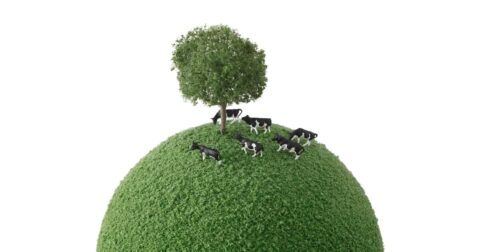Explainer
The Causes and Effects of Deforestation, Explained
Climate•8 min read
Perspective
To reduce greenhouse gas emissions, we need to change the way we eat. Councilman Justin Brannan has a message for the people of New York City: "Let's get it done."

Perspective • Climate • Policy

Words by Justin Brannan
At this point, I don’t think I need to remind you of the real and present danger of climate change. Ever since Superstorm Sandy hit in 2012, the fact that climate change drives more frequent and severe extreme weather events has been a major concern for us archipelago New Yorkers—especially those of us living along the city’s 520-miles of coastline. More recently, Tropical Storm Henri deluged New York City with record-breaking rainfall that overwhelmed our sewers and roadways.
Barely a week later, Hurricane Ida one-upped Henri and delivered a level of rainfall that meteorologists have described as once-in-500 years for New York City, damaging buildings and infrastructure and prompting President Biden to declare a major disaster in our state. That the same storm could wreak havoc on Houma, Louisiana and Hollis, Queens—1,000 miles away and days later—is our new reality.
What else do you need to know? We need to take real societal action to protect ourselves from the effects of climate change, which are here to stay and will only get worse as time marches on. While climate change is a huge, complicated problem and is going to have to be addressed through multiple, interrelated approaches, there are thankfully some simple things we can do to make a real difference. Here’s the one I want to talk about here: New York City needs to shift toward a plant-rich food system.
Our food system plays a critical role in addressing the climate crisis. And there’s no question that this crisis is being exacerbated by the production of animal-based foods. The United Nations concluded that raising animals for food contributes nearly 15 percent percent of human-caused greenhouse gas emissions.
This summer, the UN released a report emphasizing that animal agriculture is a leading cause of global methane emissions. Indeed, the United State’s own Environmental Protection Agency has reported that animal agriculture is the largest source of our country’s methane emissions. As if driving emissions weren’t enough, the animal agriculture industry also contributes to accelerating the burning of forests, thereby compromising the environment’s natural ability to remove greenhouse gasses from the atmosphere. Conversely, it has been well-documented that higher proportional consumption of plant-based foods cuts carbon emissions, saves money, and results in better public health outcomes.
This is obviously a national and global issue, but big cities like ours can make a huge difference. Some of the largest cities from around the world have found that up to 75 percent of their greenhouse gas emissions are related to meat and other animal food products—that’s more than cars, trains, planes, and all other forms of transportation combined. The majority of the world’s food is consumed in cities and our city is one of the world’s biggest. With our food-related budget of more than $970 million, New York City has an opportunity to play a pivotal role in combating climate change.
As we wrestle with how to reduce emissions, it’s important that we expand clean transportation and advance green infrastructure, but also that we do more. We must also examine how food contributes to climate change, and shape policies accordingly. Our purchasing power presents an incredible opportunity to advance both climate and food justice.
For these reasons and more, I was proud to help bring climate-friendly, healthy, and equitable food to our communities by championing Meatless Mondays in New York City public schools. This program ensures that students have access to nutritious, plant-based meals at least once per week. Expanding Meatless Mondays would not only help raise awareness about the importance of increasing plant-based options in our diets, but this program reduces carbon dioxide in our city. My office also helps distribute plant-based meals to constituents around the winter holidays. Nobody in New York City should go hungry, and all our residents deserve access to healthy, sustainable, eco-friendly foods.
There’s so much we can do to take this further, all while facilitating all New Yorkers’ access to food that meets high environmental and nutritional standards. We can take a magnifying glass to the city budget and ensure that city procurement prioritizes a higher proportion of plant-based food. We can do more to track our environmental impact and reduce our food-related emissions.
The way a city spends its money directly reflects its values. If we are serious about reducing our carbon footprint, we should invest in the future by divesting city resources from harmful industries such as animal agriculture. I can promise you I will prioritize these policies during my next term. To my colleagues and all New Yorkers: let’s get it done.